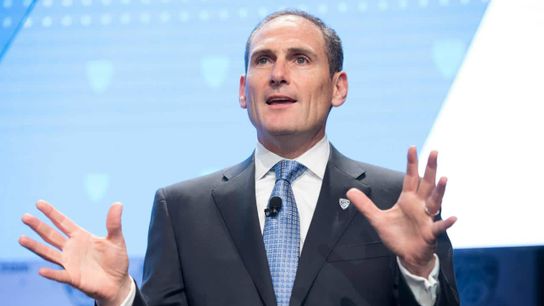Pac-12 leadership is in discussions to hire a consultant whose listed duties sound awfully familiar to that of a conference commissioner.
The great Jon Wilner of the San Jose Mercury-Newsobtained emails between the presidents of Oregon, Washington and Colorado discussing hiring a new consultant ahead of the Pac-12's latest round of media rights negotiations. (Emphasis added.)
“The scope of work might dictate the consultant,’’ Oregon president Michael Schill wrote to Colorado chancellor Phil DiStefano and Washington president Ana Mari Cauce in June.
“If it just were a media deal than (sic) any of the three might work. However, if it is the entire structure and composition of the PAC 12 as we discussed on the call, then I wonder whether consultants whose main experience is from the business world would be appropriate.
“Our values go beyond maximizing revenue. Or, at least they did prior to the current financial issues.”
So there we have one Pac-12 president referencing to two others a previous conversation of hiring a consultant who who would examine "the entire structure and composition of the PAC 12," someone who report his findings directly to the Pac-12 executive committee -- not commissioner Larry Scott.
In an additional email, an outside advisor retained by the Pac-12 recommended a candidate: Randy Freer. That name may not anything to the college sports layman, but he's exactly the type of person the No. 5 of the Power 5 conferences would need to get on its payroll ahead of the upcoming round of media rights negotiations.
As Wilner writes:
According to documents, their top choice for a consultant is Randy Freer, the respected former head of Fox Sports Media Group, Fox Network Group and, until January, the chief executive of Hulu.
Freer is well versed on Pac-12 media rights strategy, having led the Fox Sports negotiations with the conference (and ESPN) on the Tier 1 deal signed in 2011.
“We believe his executive leadership experience at Hulu and Fox Sports, as well as his knowledge of the industry, makes him a viable candidate,’’ Sonsini, one of the advisors, wrote to DiStefano, the Colorado chancellor.
Now, suggesting the hiring of a media-rights consultant is a long way from naming that person the Pac-12's newest commissioner. But the following facts about Scott's tenure remain.
1. Scott bet his entire tenure on the Pac-12 Networks, which was to be a series of six regional networks plus one national channel. Unlike the Big Ten (Fox) and the SEC and ACC (ESPN), the Pac-12 did not partner with an existing TV giant to get the network up and running.
2. Because of that, the Pac-12 Networks remain just a rumor for most of the country. A 2018 estimate pegged that the Networks were in just 18 million homes, compared to 59 million for the SEC and 51 million for the Big Ten. "We’re in way more homes than the Pac-12 Network has today, and every (distribution) projection we’ve been given over the last three years has been hit on the nose," Virginia Tech AD Whit Babcock said upon the ACC Network's launch.
3. Those same Networks laid off or furloughed 88 employees last week, while costs to operate them remain exorbitant.
Much of that is certainly due to the fact that the Pac-12 also has to pay for TV headquarters on top of conference offices... but this was the arrangement Scott wanted.
4. Scott is the highest-paid commissioner in college sports, largely because of his "dual role" as head of the Pac-12 Conference and the Pac-12 Networks. He did take a 12 percent cut earlier this year... which still keeps him in the neighborhood of $4.5 million. The SEC's Greg Sankey makes a reported $2.5 million per year. The ACC's John Swofford makes a reported $3.5 million.
Again, no one's saying the Pac-12 is going to cut Scott loose when his contract expires in 2022, but you wouldn't have to look very hard to find reasons to do so.
